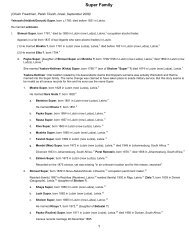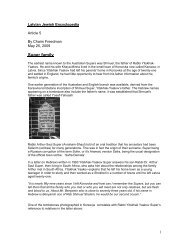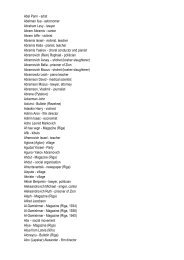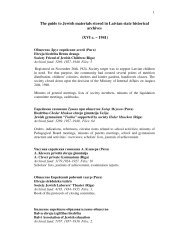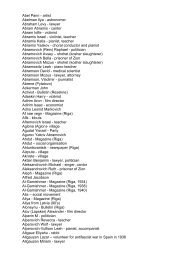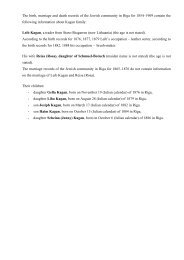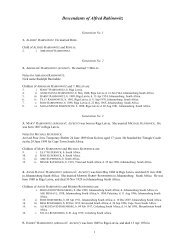Small Riga Ghetto
Small Riga Ghetto
Small Riga Ghetto
You also want an ePaper? Increase the reach of your titles
YUMPU automatically turns print PDFs into web optimized ePapers that Google loves.
244<br />
us the "high-society table". If they were cursing us, they called us "the intelligent<br />
ones". The engineer Senitzki from Vilno sat opposite me. Besides my<br />
comrades Gustav Joffe, Jakob Zinnmann and Birkhahn, who later died of starvation,<br />
there were also other genuinely intelligent young men in my table<br />
group. Whenever the food was distributed, one had the best opportunity to observe<br />
every individual's character and degree of refinement. All of us were<br />
starving, and basically nobody could wait to sit down to eat. Of course no precisely<br />
equal distribution was possible. Outwardly self-controlled but inwardly<br />
baring our teeth in anticipation, we watched the bread until it was distributed.<br />
In order to be as fair as possible, we invented the following procedure. One of<br />
us had to stand with his back to the table and was then asked before each piece<br />
of bread was handed out: "Who gets this one?" Thus the distribution was entirely<br />
even-handed. After the bread had been distributed, a veritable exchange<br />
market was opened. One man would trade his bread for soup, another for<br />
margarine and so on. Or someone would buy a knife, a spoon, a needle or the<br />
like. The bread was measured out in centimeters as a means of exchange, so<br />
each of us always carried a small ruler. More than once, when a person urgently<br />
needed a small piece of shaving soap or something else, he would have<br />
to go without a whole meal in order to get it.<br />
The bread was handed out every evening for all of the following day. That<br />
meant it had to be parceled out. I worked out a system for myself, which consisted<br />
of eating all the bread at once. Of course that meant I had to go hungry<br />
all the following day. Once I tried to eat the bread in two parts, but during the<br />
night I couldn't sleep until I had eaten up the bread I had saved. My comrade<br />
Joffe, who didn't approve of my system, resolved every evening to save a<br />
piece for later, but in the end he couldn't wait so long either and ate everything<br />
up. The only resolute man was Sienitzki: he always divided his bread<br />
ration into portions. He was also the only one in the Magdeburg concentration<br />
camp that I was really friends with, and when we separated after the liberation<br />
this parting was very emotional for me.<br />
After meals, Joffe would often tell us about his world travels, and the entire<br />
political situation would also be discussed. In the final phase we had to rush<br />
through our dinner, because the Americans would "pay us a visit" regularly.<br />
The lights had to be put out beforehand. During my time there, the city of<br />
Magdeburg was heavily bombarded twice. From afar, we saw it burning for<br />
several days. Both the Americans and the English were very precise in their<br />
work. They dropped their bombs only a few meters from our concentration<br />
camp but left us entirely unscathed. We were actually convinced that our fac-



